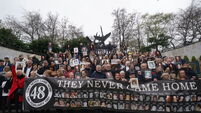Witness paid $1.25m to infiltrate group, court told
The key witness in the trial of alleged Real IRA leader Michael McKevitt was paid $1.25m to infiltrate the dissident republican group, a court heard today.
FBI and MI5 agent David Rupert received the cash over a six-year period in return for a daring operation that took him right to the heart of the terror organisation behind the Omagh bomb atrocity, lawyers said.













